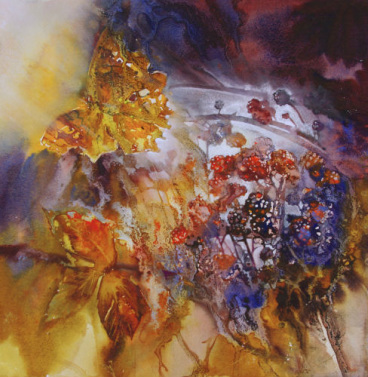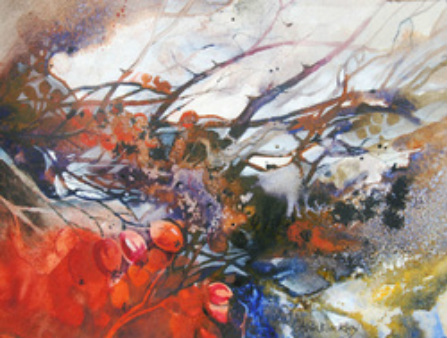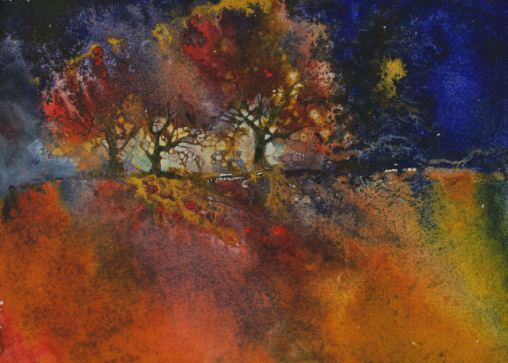Interviews with other artists.
"The obvious answer is my father, John Blockley. I think he is probably one of the reasons why I began to paint, because I was surrounded by art.
I also admire and was influenced by Arthur Rackham, the Victorian illustrator of fairy tales. He used to create a fantasy world and that's what I try and do in my paintings; create a magical fantasy. I admire many other artists but one that jumps out is the contemporary painter, David Tress. He doesn't paint in watercolour and it's completely different to what I do, but it's interesting that you can be influenced by all sorts of people even though you end up being something completely different yourself."
Watercolour is said to be the hardest medium to work with. Why do you choose to paint with it?
"I didn't really choose to paint with it, it just happened. My childhood home was full of watercolour so it didn't occur to me to consider any other medium. I think the reason I've stuck with it, even though it is very difficult, is that it's addictive and I never seem to get to the stage where I feel I've mastered it. I always feel I could be better. One of the reasons why I would choose watercolour over any of the other mediums is because of the way it flows. With other mediums you have to MAKE things happen, whereas with watercolour it's magic if you give it the freedom to flow and paint itself ."
"I feel everybody focuses too much on materials and which ones to use. I think it's far more important to focus on finding something you actually want to say in your painting by looking at things and finding your passion. That will have more influence on the way your paintings will turn out than whether you use a particular brand of paint or paper."
What is your preferred method for reserving the white of the paper? What are your views on the use of white paint or masking fluid?
"When I first learnt watercolour I would always reserve the white of the paper with masking fluid, because the style I had was to reserve a little piece of paper that would subsequently become a focal point in quite a detailed way. Now I'm happier to paint around areas that I want to keep clear without the use of masking fluid. However I also often use opaque white paint on top of washes as a way of creating order out of my first washes. So, anything goes."
Some artists paint only one subject whilst others paint many different ones.
In your opinion Is it a help or a hindrance to limit subject matter?
"I think the important issue is to do with developing your voice. Every artist's ultimate aim is to have their own style. Once you have got that voice I don't think it matters what you paint, it will shine through. I started out by painting flowers and actively avoided other subjects, especially landscapes. This was mainly because my father was a ground-breaking landscape painter and I felt inhibited by this. Now I have overcome this hurdle I feel released to paint anything I like. The decision is very personal."
I feel beginners should limit their colours in order to learn colour mixing and the properties of the pigments before adding to their collection. I'd like to challenge you to pick just 6 colours. Which ones would you choose and why?
"The properties of pigments are not my first and foremost consideration. I just go for colour.
The thought of only being allowed six colours makes me feel quite distraught! Having said that, the question has made me think. If I could only have three I would have French Ultramarine and two Quinacridone colours - Quinacridone Gold and Quinacridone Magenta. They are great colours – they would be my desert island three."
"I'm on Facebook and Twitter. I don't do much on them but when I do I like the connection with like minded people and it boosts my confidence to see people 'liking' my work. In terms of drawbacks - it can take up an awful lot of time, but you can't paint ALL the time!"
When did you become a professional artist?
"I can't remember a time when I wasn't. I went from Art College straight into work as a commercial illustrator. Then I gave that up to be a 'proper' artist! So I've always painted in one form or another."
Was there one defining moment when you realised that you had become famous?
"Actually there WAS a defining moment. It was when I was contacted by someone in Australia asking if I would go and teach out there. I had made DVDs and written books on watercolour but hadn't really realised how worldwide they were. It surprised me. It still does."
What is/are your goal(s) as an artist?
"I just want to be the best artist I can be. It's not a competition with other people or about fame or money. I enjoy any success I achieve in these departments but it's more to do with creating my absolute best work. Whether you're an amateur or professional artist, we're all in the same boat, always reaching up to the next level."
Watercolour painting is full of "rules". What rules, if any, do you break?
"All of them! Although I think that you do need to learn the basics when you begin because you must know the rules before you break them. The basics would be how to mix a consistency, drying times and how to do a proper wash. Then you can start messing it about."
If you could only give one piece of advise for people new to watercolour what would it be?
"Learn how to do a wash - and then relax and "let go". Students have a fear of letting go. They worry about watercolour and want to control it - but by letting go you see how watercolour behaves and you can learn from that. So in a nutshell - let the watercolour paint itself rather than always trying to control it."
www.annblockley.com



 RSS Feed
RSS Feed